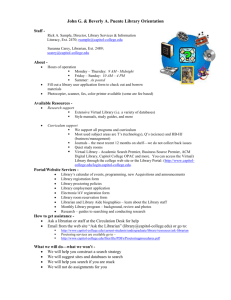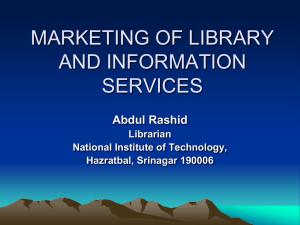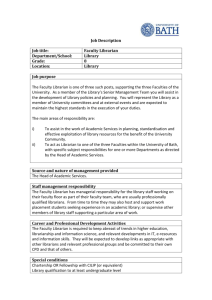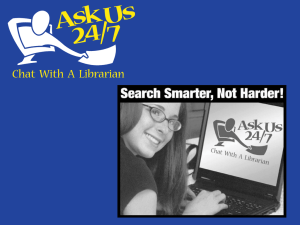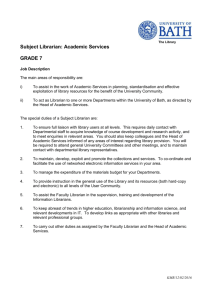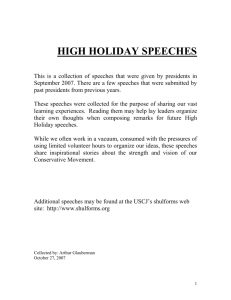Hello, - Association of Jewish Libraries
advertisement
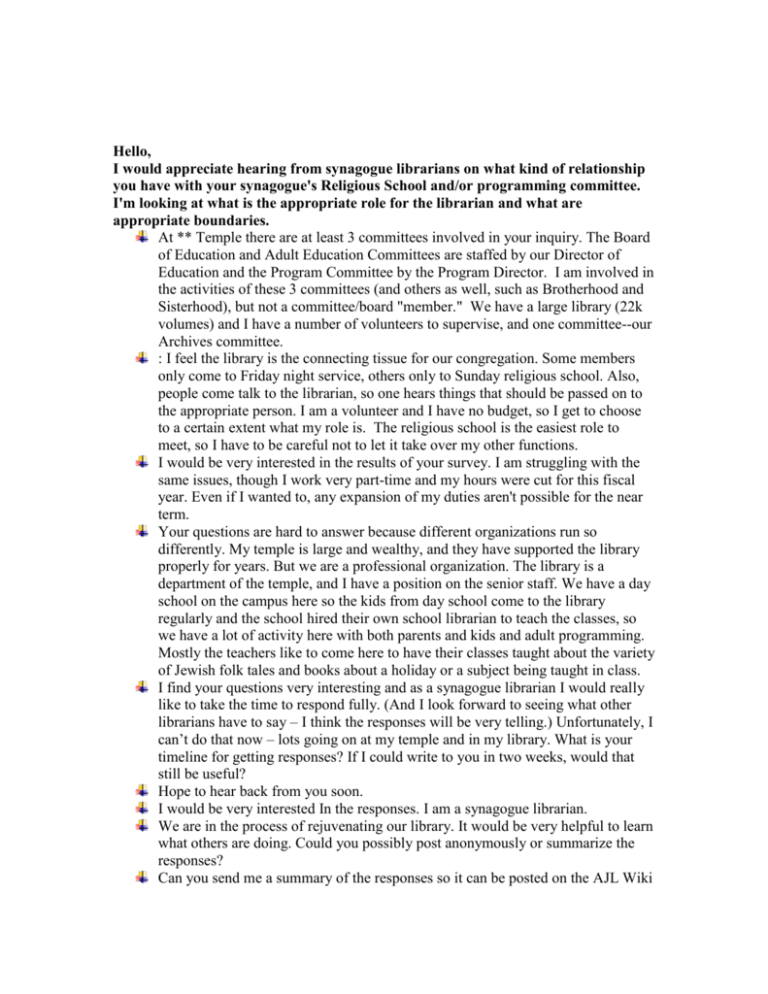
Hello, I would appreciate hearing from synagogue librarians on what kind of relationship you have with your synagogue's Religious School and/or programming committee. I'm looking at what is the appropriate role for the librarian and what are appropriate boundaries. At ** Temple there are at least 3 committees involved in your inquiry. The Board of Education and Adult Education Committees are staffed by our Director of Education and the Program Committee by the Program Director. I am involved in the activities of these 3 committees (and others as well, such as Brotherhood and Sisterhood), but not a committee/board "member." We have a large library (22k volumes) and I have a number of volunteers to supervise, and one committee--our Archives committee. : I feel the library is the connecting tissue for our congregation. Some members only come to Friday night service, others only to Sunday religious school. Also, people come talk to the librarian, so one hears things that should be passed on to the appropriate person. I am a volunteer and I have no budget, so I get to choose to a certain extent what my role is. The religious school is the easiest role to meet, so I have to be careful not to let it take over my other functions. I would be very interested in the results of your survey. I am struggling with the same issues, though I work very part-time and my hours were cut for this fiscal year. Even if I wanted to, any expansion of my duties aren't possible for the near term. Your questions are hard to answer because different organizations run so differently. My temple is large and wealthy, and they have supported the library properly for years. But we are a professional organization. The library is a department of the temple, and I have a position on the senior staff. We have a day school on the campus here so the kids from day school come to the library regularly and the school hired their own school librarian to teach the classes, so we have a lot of activity here with both parents and kids and adult programming. Mostly the teachers like to come here to have their classes taught about the variety of Jewish folk tales and books about a holiday or a subject being taught in class. I find your questions very interesting and as a synagogue librarian I would really like to take the time to respond fully. (And I look forward to seeing what other librarians have to say – I think the responses will be very telling.) Unfortunately, I can’t do that now – lots going on at my temple and in my library. What is your timeline for getting responses? If I could write to you in two weeks, would that still be useful? Hope to hear back from you soon. I would be very interested In the responses. I am a synagogue librarian. We are in the process of rejuvenating our library. It would be very helpful to learn what others are doing. Could you possibly post anonymously or summarize the responses? Can you send me a summary of the responses so it can be posted on the AJL Wiki for everyone to benefit from? Thanks. As an information specialist, do you have input into or responsibility for purchasing texts, supplementary materials, videos, etc. used by your Religious School? I do not purchase the textbooks for religious school classes, but do maintain a Teacher Resource Center, and religious school teachers and staff certainly use the videos and other materials I purchase. The religious education committee decides on the curriculum and can get a better deal ordering the materials. I provide input into supplemental materials mostly. (disability resources/supplemental texts/alternative learning styles,etc.) At **, I work with the Religious School director to purchase books and DVDs for the Youth library (the budget for that library is under her control, not the library committee) and to suggest books that might be of relevance to the curriculum. We buy various teacher resources for our teacher shelf, but not as much as we used to. We certainly don’t have much to do with supporting the direct purchase of texts or educational materials and let the religious school office take care of their own needs. We supplement with literature and book related things. We do buy videos that teachers use, like something on Tu-b’shvat or Passover, etc that they would like, but try not to duplicate what the school has in the principal’s office. :No YES. Find out what they are teaching. Get the curriculum and when you purchase new material contact the school director share with him/her all the new acquisitions. Make a list and email it to the teachers, Rabbi, your committee chair and the school Board. If possible add short annotations. Do you maintain any kind of "teacher's resources" books either combined with or separate from your library? I maintain a Teacher Resource Center, and religious school teachers and staff certainly use the videos and other materials I purchase. I maintain a teachers' resources area, which I try to promote. Yes. We had a separate Teachers Resource Room with a table and a computer. Teachers were made welcome, but most of them preferred that we do the search for them. I maintain a separate “Professional Collection.” It is housed in the library, but the collection is shelved separately from the regular collection. Are you involved with any staff education or in-services for the Religious School teachers? I used to meet with the former Religious School teacher once a week, or at least once a month, and attended teachers meetings when I could. If the principal sees me as a resource, rather than just somebody to read to the kids, we work much better. As with all school librarians, some teachers used me much more than others. The Bnai Mitzvah class teacher used me extensively. I spend a lot of oneon-one time with interested teachers showing them resources we or the community have, but some teachers claim they don't need any help. Our teachers are rabidly protective of the limited class time they have, so I have to do most of my work outside of class or during snack break. I help the students select Holocaust books to read in the 7th grade, discuss mitzvah projects with them, sometimes do a short segment on how to research charitable organizations, etc., but mostly only read to grades preschool to 3rd grade, when I can. Sometimes, when I feel that the religious school is not paying enough attention to us, I offer to host classes on Sundays and I read them stories related to their curriculum and check out books to them It is an issue to get those books back, but we still try. Right now I am helping to teach a computer class on Sundays in the school computer lab that shows kids how to make their own little video of bible stories they have learned, that we will show the school in May. Yes – I attend the weekly religious school faculty meetings and any/all in-services that I am able. We came to the teachers orientation meetings. We, than, gave flyers with the library hours, policy and short bibliographies. For example: at the beginning of the school-year we offered ideas for teaching about the high holidays, Bible stories etc. I used the school curriculum. Are you are member of your synagogue's education committee? I'm on the Religious School committee but not in my role as a librarian but as a parent of students in the school. No but I am a member of the education staff If they do not mind join the committee. Promote the library and let them know your need while offering help when they need it. Same question for programming--do you serve on the programming committee? If not, does the committee view you as a resource for finding appropriate movies, speakers, etc. for the congregation? I would say that I am routinely consulted as a resource person by our rabbis and staff. I am either on the Programming Committee or attend as many meetings as I can. I also attend Fundraising meetings, since they also often overlap. I have made suggestions for programming (monthly film suggestion, book suggestions for book clubs, lecture) as they arise but I'm struggling to find the appropriate channel for doing this since the rabbis have their own goals and programs (limited coordination of adult education unlike the children's) and I get the feeling that the administration would prefer me to limit my role to just the library and not work with member groups. We do not have a programming committee, but yes, very much so! Yes. They will appreciate your input if you do. Do you plan programs for the entire community as part of the programming committee or strictly as a library event? Our Archives committee has also done programming for the temple. As a historic congregation, we maintain a large archives. For example, I have done a Sukkot program for the past several years on what I call "***Temple Ushpizin" to introduce congregants to our own temple ancestors worthy of our emulation, just as our biblical ancestors/ushpizin are. I do limited library programming for the entire congregation, usually one event a year, such as passover cooking to showcase our cookbooks and give the items to nursing homes/send to college students/ or wherever. I have done Hannukah in the schools programs, interfaith books programs, etc. I try to do a used book sale once every 2 years or so at Shavuot. I tried to hold an archival night, where we would videorecord older members' memories, which was a failure. I try to maintain an informal archive. Mostly I use the library column in the newsletter, the book carts, and displays to reinforce whatever else is happening. Programming steps on too many toes, is time consuming, and difficult to organize. Just scheduling a time and place for a library programs raises hackles, much less overlapping others' activities. Mostly I just tack on to whatever else someone else is doing (a reading corner during Purim festivities for those shy/quiet kids, a corner of the gift shop to sell used books grandparents might want to read to their visiting grandkids, book donations for auction fundraising, a book display supporting an activity, etc.) Usually by the time somebody wants to do a program, they are so invested, they rarely welcome another, but I do forward suggestions for books, movies, programs to the appropriate chairperson. What they do with it is their business. I run independent programs through the library, such as inviting authors to speak or running book clubs, or classes, or movie days, or what have you. I have a budget for event planning and also books and av equipment. We just bought kindles and nooks from a donation. Both – I plan library sponsored programs but I also work with other departments on joint programs (ie Adult Education, Sisterhood, etc.) and on synagogue wide programs. We mostly concentrated on Jewish Book Month events and children story time. We were asked to help in planning Holocaust memorial day and the Israel Independence day. I do programming strictly as a library event. Besides your role as librarian, do you serve your synagogue in any other capacity, such as a Religious School teacher, adult education teacher, other committee member, event volunteer, etc? I teach courses in Adult Education, have reading incentive programs for grades 1-6 in the religious school, and have given programs--for example, a session in our Synaplex evenings. I provide bibliographies and book displays for most adult ed classes and for other programs when appropriate. I attend and support adult education when I can. Because I do feel the librarian provides the connective tissue, I do volunteer at a lot of events or help with fundraising, etc., but not necessarily in a "librarian" capacity. My other roles at *** are a result of being a member here as well, not due to my librarian role. Since I am also a member of the synagogue and parent of young children, I volunteer to lead Tot Shabbat and help plan the holiday “Pray & Play” programs. I was also teaching in the Religious school and the adult education program, but it was a separate job, My job in the library was part time so I had time for it. I also helped with the Sisterhood programs. How do you educate new staff or Board members in order to preserve institutional memory regarding your role/accomplishments as librarian? I strongly believe that the synagogue would exhaust a librarian without realizing it. Each group wants you to do their hard work: choosing and ordering books, having their programs, etc. I think the library has to decide what its goals are before it can be effective. The Torah study groups wants you to order their books, others want you to buy fiction or DVDs, parents only see you in the religious school context, new volunteer board members need gentle counseling on their new role and books are a way to avoid personality clashes, students want help with a research project at public school. One person, unpaid or underpaid, cannot meet everybody's needs. You know your strengths and weaknesses the best, so you decide how to meet your congregation's needs. We have a part-time archivist who's responsible for preserving institutional memory. As for educating the Board members and staff, the director of the library committee takes on that role with the board members (she can present to the board meetings as a committee head but both our husbands are on the board so we both educate them on our needs) while I try to educate the staff. I have been to board meetings highlighting what the library can and does do – probably every year or so---in order to keep everyone in the loop. We are lucky here that our temple is so supportive. I don’t know that it will remain that way so much when I eventually retire! I have met with the new staff so that I can explain my background and how I am able to support them. But, mostly I just show them what I can and will do! This is too long to write, but I will be happy to talk with you. I am r tired so I have time. What do you do if your own expectations of your role are at odds with your institution's perceptions of your role? One of my goals is to be ubiquitous in our congregation, and our library gets wonderful support from our rabbis and temple members. I strive to do what I can to make the library a presence in the programming and education areas, and to exceed whatever expectations people may have of their temple library. I have a list of goals and objectives for the library, which I divided into 4 separate functions: religious school, synagogue administration, the rabbi and the congregation. Different rabbis have used my services differently, as have different boards and different chair heads. If you want a copy of my forms, I can send them. I also prepared a 5 year report and put myself on the Board agenda to discuss the library. It's time for a new 5 year report, which I haven't done yet. (I've had 2 co-librarians die, another leave, and got overwhelmed with family issues, so this last 5 years is more problematic.) If you would like a copy of that also, I can send it. I share my religious school goals and objectives with the principal, and sometimes hand them out at a staff meeting, if I think it is needed. One rabbi I used to meet with once a week, the current rabbi doesn't see a need for me at all, so I just e-mail her my copy. Many of the leadership attend Torah study, so they nab me when I go, which keeps me visible in a less threatening manner. I’m not sure if I understand your question. I guess when I started here 3 years ago, I did have to prove myself but luckily, it didn’t take too long. I still do feel that some of the departments and staff do not utilize me as much I would like but I’m slowly trying to change that. This is the reason that my former assistant suggested that you quit. I did not feel welcome and I got very little cooperation from the school’s administration. It takes time to find the happy medium. As the former chair of the ***committee and , now as the chair of the *** I talk to many synagogue librarians. It is also the talk at the round table discussion at the conventions. You are not alone. I chose to work with those that showed appreciation; Mostly individual teachers. Other: Yesterday, my friend returned from a visit to another city, to a very large temple there where she used to live, and told me how they have cut back the library hours. Your question was important; synagogue librarians must get themselves involved in all the things you asked about, or we will be another disappearing breed. Personally, my suggestion is to do a quarterly (at least) newsletter, which keeps your accomplishments in members' minds, stay away from library programming (contrary to every other type of librarianship advice). See if Religious Affairs will let you do a storytelling/library service once a year if you need to do programming. If you articulate in your goals what you are doing elsewhere in the congregation, then let those groups argue about who gets your services, not pressure you. If others want to limit your services, I personally would ignore them. If others want to overburden you, then the newsletter and the goals help your case. I explain that the librarian thinks about their role in the congregation, and often others haven't thought their requests through. Rarely is it a case of a completely different vision of what the congregation should be. If it is, lay low until the leadership changes. This is a problem in all libraries, especially special libraries, but I think it's much worse in a synagogue, for a variety of reasons. Good luck






